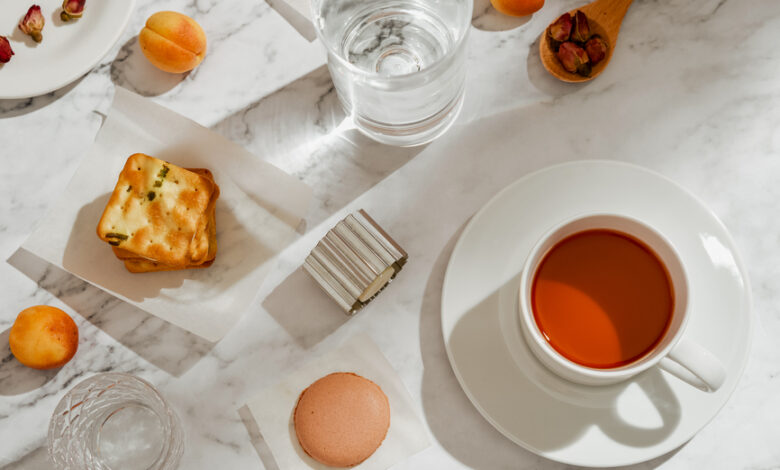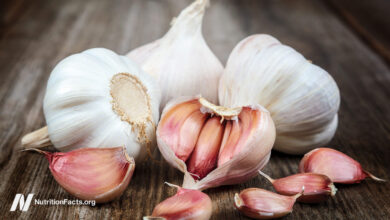How To Make Coffee Flower Tea and Its Benefits

Ironically, feeling torn between the two most magical morning beverages—coffee and tea—is exhausting. Instead of letting the pain of indecision (ahem) steep, brew yourself the best of both worlds: coffee flower tea.
Whether you’re trying to cut back on caffeine intake or you simply want something more subdued in flavor, coffee flower tea may just become your new drink of choice.
What is coffee flower tea?
According to Jordan Michelman and Zachary Carlsen’s new book, But First, Coffee, turning coffee flowers—which are “aromatic and distinct, with notes of jasmine and honeysuckle” and grow on coffee trees—into tea is one of the smartest ways to reduce your coffee consumption-related waste.
“Like cascara [a beverage made from coffee cherry husks], coffee flower water uses a commonly discarded part of the coffee plant,” Michelman and Carlsen say. “A kind of herbal tisane made using hot water and coffee flowers has been known for centuries in coffee-growing communities.” In order to prepare the tea, coffee flowers are first sun-dried on raised beds. Then, you can steep them as you would a good tea or herbal tisane.
The health benefits of drinking coffee flower tea are bountiful, BTW
According to Lauren Manaker, MS, RDN, LD, CLEC, CPT, a registered dietitian based in Charleston, drinking coffee flower tea has some benefits. “It’s rich in antioxidants such as flavonoids, it helps combat oxidative stress, and reduces inflammation in the body,” Manaker says. “The tea also can provide a calming effect, reducing anxiety and promoting relaxation. Furthermore, its antibacterial properties can aid in oral health.”
Despite these potential benefits, Manaker says it’s always advisable to consume it in moderation and consult a healthcare professional for personalized advice on how to introduce it to your diet.
“[Coffee flower tea] is rich in antioxidants such as flavonoids, which helps combat oxidative stress and reduce inflammation in the body. The tea also can provide a calming effect, reducing anxiety and promoting relaxation.” —Lauren Manaker, MS, RD
Coffee flower tea vs. regular ol’ coffee
Although they may sound like closely-related siblings, they’re more akin to close cousins. “While coffee flower tea and traditional coffee come from the same plant, they differ significantly in terms of caffeine content, flavor, and health benefits,” Manaker says. For starters, herbal drink won’t trigger caffeine-induced jitters. “Unlike regular coffee, which is high in caffeine, the tea contains little to no caffeine, making it an excellent option for those looking to reduce their caffeine intake,” she says.
“Unlike regular coffee, which is high in caffeine, the tea contains little to no caffeine, making it an excellent option for those looking to reduce their caffeine intake.”
Then, in terms of flavor, the tea is much more subdued than, say, a double shot of dark roast brew. “The flavor profile of the two also varies. Coffee flower tea is noted for its light, floral taste, in contrast to the robust, full-bodied flavor of coffee,” Manaker says.
Finally, the health benefits are different between the two, and the tea may even possess a few more enticing qualities than its counterpart. “In terms of health benefits, both beverages are rich in antioxidants, but coffee flower tea is said to offer a broader range of benefits, such as improving blood sugar regulation and possessing antibacterial properties, but more data is needed to confirm this,” Manaker says.
Who shouldn’t drink coffee flower tea?
Before introducing this beverage into your morning ritual, it’s important to note that it may not be suitable for everyone. “People with an allergy to the coffee plant could potentially react to coffee flower tea. Plus, those with a sensitivity to plants in the Rubiaceae family should abstain due to the risk of cross-reactivity,” Manaker says. She also cautions that pregnant and breastfeeding people should be cautious and consult with a healthcare professional before consuming the tea, as there’s limited research on the tea’s effects in these instances. “Individuals with chronic health conditions or those currently taking any medication should seek medical advice before introducing coffee flower tea into their diet, as it could interact with certain drugs or exacerbate existing health issues.”

How to make coffee flower tea recipe
Yields 1 medium pot of tea
Ingredients
4 grams (1 teaspoon) dried coffee flowers
220 milliliters (not quite 1 cup) water heated to 176°F (80°C), which is just before boiling
1. Start with your favorite teapot, glass server, or sizable brewing vessel. A small Chemex works great here if that’s your preference.
2. Pour the hot water over the coffee flowers and start a timer set for two minutes. Allow the flowers to steep the full amount of time, then decant the brewed tea from your vessel—don’t over-steep the flowers.
Excerpted with permission from But First, Coffee by Jordan Michelman and Zachary Carlsen © 2023. Published by Union Square & Co. Photography © Zachary Carlsen
A registered dietitian shares the benefits of drinking regular ol’ coffee:
Our editors independently select these products. Making a purchase through our links may earn Well+Good a commission.

